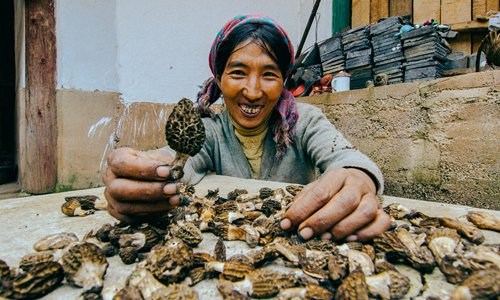
Yang Xiuchuan, one of the beneficiaries of Oxfam Hong Kong's microcredit program, shows her homegrown edible fungus in her village in Lijiang, Yunnan Province. (Photo/Oxfam Hong Kong)
Better and worse trends
In recent years as the country has tightened its crackdown on corruption and misconduct within the Party, NGOs say in some ways it has become easier to fight poverty.
In October 1985, Heifer International sent a shipment of 158 dairy goats and 200 quality breeding rabbits to Sichuan, starting its cooperation with China.
But it took almost 20 years for Heifer to formally register in China as a non-profit organization. Often kicked between different government organs, the registration for foreign NGOs has been lengthy and complicated, which means many NGOs once worked in the country without registration.
Chen recalled that at the beginning the animal husbandry bureau which they were affiliated to occasionally misappropriated funds and livestock.
The support groups were supervised by the village's Communist Party of China committee; a few county officials used to require Heifer projects to go to communities in which their relatives live; projects were often disrupted due to leadership transitions (as the newly appointed officials believed the projects, initiated by their predecessor, would not be counted as their own achievement).
"But now the situation has improved greatly," Chen told the Global Times.
China this year adopted its first Charity Law after 10 years of discussion. Taking effect on September 1, the law eases restrictions on fundraising by, and the operation of, charity groups, and orders local authorities to offer them tax benefits.
But since the law was passed, many provinces still haven't issued any practical regulations on the law and charities still have to pay taxes on each donation.
Another area in which increasing pressure is piling on overseas NGOs is fundraising. The new management law bans them from raising funds on the mainland, but their efforts are becoming more challenging overseas.
According to Liao, Oxfam Hong Kong's funds mainly come from regular donors in Hong Kong and Macao. But as mainlanders swarm into Hong Kong to buy luxury items, it's getting harder to convince Hongkongers that their donations are still needed given the regional disparity and wealth gap in the mainland.
"China is still the second largest country in terms of its population of poor people. We at times invite donors to visit the families we assist," Liao said.
The impact of pan-democrats and "pro-independence" activities in Hong Kong on donations is slim due to their small number, he said.
Chen has met similar difficulties while raising funds in foreign countries. "The foreign donors' initiative is declining. They think that China can deal with poverty itself as it is the world's second largest economy, the US's top creditor, and have many rich people who are now able to send their kids to study overseas," he said.
Merits and defects
Despite this increasingly frosty relationship, many NGOs believe local governments can still play an important role.
To accomplish the national mission to eradicate poverty within four years, many regional governments have set tough requirements and tasks that officials must meet. At total of 540,000 officials have been sent to work in villages to supervise poverty reduction work.
This pressure has generated some side effects, and there have been reports about local governments forging statistics.
Chen Shiquan, a resident of Chengdu who has been working in poverty relief, said counterfeiting is not uncommon at the grass-roots level.
"Some villagers even work with local officials to forge projects to cheat State funds. They temporarily establish large pig farms or other cooperatives, but disband soon after dividing the subsidies allocated by the government," Chen told the Global Times.
Some officials in Chengdu have even rejected poverty relief assistance from foreign NGOs out of fear that it would defame the city, which has a good reputation for quality of life, he noted.
Chen Taiyong said another major challenge is that the public's overall view of charity is still backward.
It's an international practice that a certain part of donations go to cover the costs of the charity's administration. But in China, donors always want all the donations end up with poor people.
While overseas NGOs are comparatively more professional and credible in their financial transparency, Li Xiaoyun believes there are still some defects.
"Due to their background, they are usually supervised by Westerners or even their own countries. It's inevitable their work are affected by thoughts of liberalism and democracy," Li said.
"Thus some ways and concepts they adopted or advocated, such as participation and gender equality, do not conform with the economic situation in the backward regions in China."
But Chen is confident in the future of Heifer China. "Some governments have also actively approached us and sought cooperation," he said, adding that Heifer China plans to help another 240,000 households out of poverty by 2020.


















































